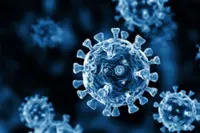Grateful lot: A family of Covid-19 survivors Dr Samsu (in white robe) and his wife Mazriemi (centre) with their children.
PETALING JAYA: In April 2020, Dr Samsu Ambia Ismail’s family of seven were quarantined together in a hospital ward for Covid-19.
He still recalled the fear and panic of having caught the virus at a time when the vaccine was unavailable and not much was known about the disease, although it has been almost three years since he, his wife Mazriemi Mohd Zaki, 43, and their five children aged between 11 and 21 recovered from their first Covid-19 infection.
Grateful at being given a second chance to live, Dr Samsu Ambia, 52, said the sacrifices of frontliners must never be forgotten and Malaysians should continue to be careful as the virus is here to stay.
“No words can explain my appreciation to the frontliners who helped us get through Covid-19.
“It was a very confusing time in 2020 throughout the world as people were scared of the disease and no one knew how to manage the virus while keeping themselves safe.
“They had no choice but to handle my family and I when we got infected,” said Dr Samsu Ambia, who is also Teluk Intan Hospital Emergency and Trauma Department head.
He said despite having their own fears as well as having to don the heavy and uncomfortable personal protective equipment (PPE) while facing a manpower shortage, frontliners gave their all in serving the people at a time of panic and chaos in the early days of the pandemic.
He said that besides appreciation for frontliners, the virus had also taught him to value life, family ties and health more.
“Many passed away from the virus but as Covid-19 survivors, we were given a second chance to live. We are grateful for that.
“We must appreciate the freedom but be cautious. There is no absolute freedom.
“There are still new outbreaks and variants, so we must be careful even if most of us are now vaccinated.
“After all our experiences, we must appreciate what we have now and remember the lost ones,” he added.
When data analyst Rosli Ahmad, 49, caught Covid-19 on Jan 10, 2021, he remembered feeling scared as there was no vaccine available and people were dying after developing severe infections from the virus.
Now two years later, it is a different story.
Rosli is now among the millions of Malaysians having the freedom to travel, dine outside and enjoy everyday activities as the country transitions to the endemic phase following a successful handling of the virus.
“Getting Covid-19 at the time was very scary because there was no vaccine yet and many developed severe symptoms with quite a number of people dying from the disease.
“More so if you had underlying medical conditions such as diabetes and hypertension which could worsen the Covid-19 infection.
“This made me realise the importance of looking after my health,” said Rosli, as he recalled how the virus became his turning point to lead a healthier lifestyle.
“So, after I recovered from Covid-19, I went on a diet by eating healthier and started going for walks and eventually took up running.”
He also acknowledged the sacrifices of the frontliners, saying that Malaysians owed a lot to them as they risked their lives every day to do their job at a time when there were no vaccines available.
“Many of us take Covid-19 for granted nowadays since we have all been vaccinated, but please remember that there are still many people who could still be vulnerable to getting serious infections, such as the elderly or immuno-compromised.
“As such, we need to take the necessary precautions even as daily infection figures at present are low,” he said.
When asked if there was anything that he felt the Health Ministry should have done differently, Rosli said it could have been more flexible and quicker in making certain decisions, such as allowing patients with mild or no symptoms to quarantine at home.
This is because in the early days of the pandemic, the government required every one who tested positive to be sent to quarantine centres instead of allowing them to isolate at home, such as is the practice now, since Jan 13, 2021.
“I recall watching the news and seeing long lines of people who were positive but had to queue for hours to get processed by the Covid-19 Assessment Centre (CAC) in order for them to be sent to quarantine centres.
“I hope that armed with previous experience, the ministry can make faster decisions when the need arises,” he added.





